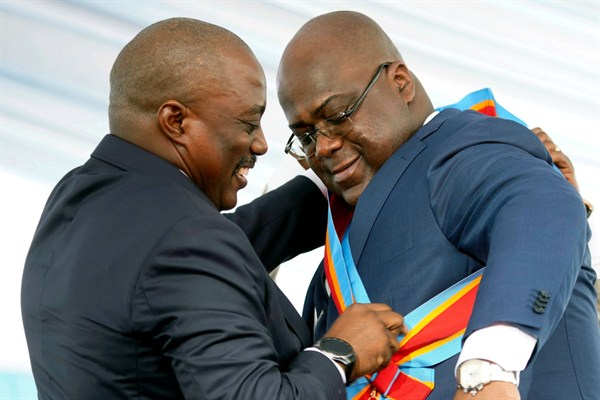Ahead of the elections held late last year in the Democratic Republic of Congo, outgoing President Joseph Kabila sat down with the managing editor of Jeune Afrique for one of several interviews he granted to international outlets during his final weeks in office. At the time, many analysts expected the presidential vote to be rigged in favor of the ruling party’s candidate, and speculated that Kabila, who had been in office for 18 years, would continue to rule from the shadows rather than truly ceding control.
Asked about his plans, Kabila told Jeune Afrique that the winner of the election would have “all the authority to apply his program.” But in other interviews he had noted that he might run again in 2023, and when Jeune Afrique’s editorial director raised the possibility of a “Putin-Medvedev-Putin scenario,” invoking the Russian president’s short stint out of office, Kabila started to laugh. “I don’t read Russian,” he said. “I need to start learning.”
The exchange was an early sign of the legitimacy issues that were bound to haunt Kabila’s successor—who, as it happened, was not the ruling party’s standard-bearer but opposition candidate Felix Tshisekedi, the son of longtime opposition leader Etienne Tshisekedi, who died in 2017. Ever since the presidential result was announced two months ago, there have been widespread suspicions that Felix Tshisekedi made some kind of backroom deal with Kabila and the ruling party. The new president’s authority has been further undermined by compelling evidence, including results collected by the Catholic Church, that Martin Fayulu, another opposition candidate, was the real winner. Moreover, purely from an optics standpoint, Tshisekedi didn’t do himself any favors when he had to sit down for a break during the middle of his inauguration speech; he cited exhaustion at the time, though a spokesman later told Reuters that his bulletproof vest had been too tight.

